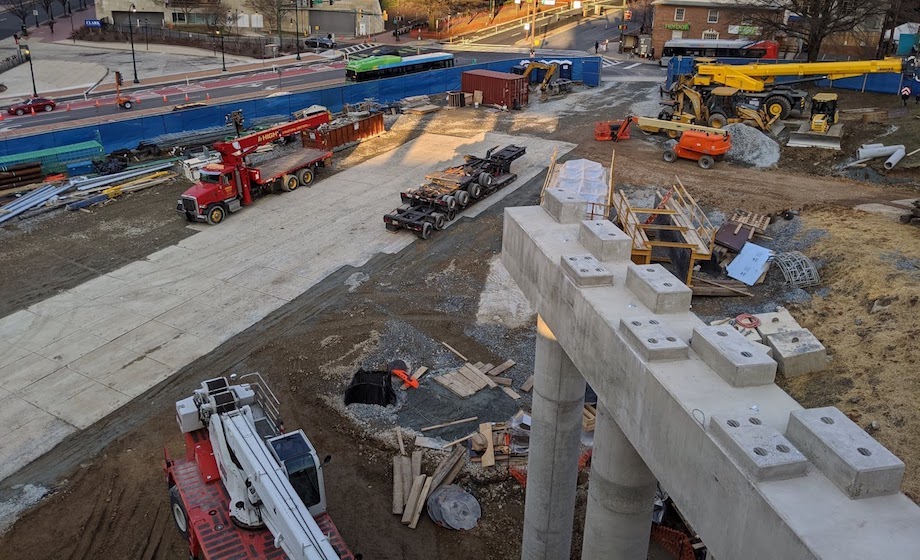The development consortium managing Maryland’s $2-billion Purple Line light-rail project can withdraw from its public-private partnership contract with the state, a Sept. 10 state court ruling says.
Baltimore Circuit Court Judge Jeffrey M. Geller, who issued a temporary restraining order last month keeping Purple Line Transit Partners (PLTP) on the job at least through Sept. 14, ultimately agreed with the consortium’s argument. He ruled that "clear, direct and absolute" contract language gave either side the right to unilaterally terminate the agreement once delays exceeded one year.
The two sides have been unable to agree on responsibility for more than two years of delay and a reported $755 million in added costs.
The state has until end of day to return to negotiating a cost agreement with the developer and its construction team, or work will shut down along the dense 16-mile project route in Montgomery and Prince George's counties, suburbs of Washington, D.C..
The state could take over the project or bring on a new management team, both disruptive options that will likely involve Gov. Larry Hogan's involvement, observers say, particularly with state plans to soon award a larger P3 contract for a critical highway interchange upgrade nearby.
"This ruling really heightens the pressure on the Maryland DOT to reach an agreement with PLTP. I hope they are able to find common ground, but the challenges of this project aren’t really a result of it being a P3," said Jonathan Gifford, director of the Center for Transportation Public-Private Partnership Policy at George Washington University in Fairfax, Va.
"Being a P3 just shines a very bright light on the hurdles and the huge costs for states and localities trying to build major projects under the U.S. system of environmental regulation, permitting and litigation," he said. "These costs can’t be shifted to the private sector, P3 or no P3. The result is that taxpayers end up paying a huge price for projects, far more than in other developed and developing countries around the world."
State Position Loses
Geller rejected the Maryland Transportation Administration's claim that the termination will cause the state “immediate, substantial, and irreparable injury,” noting that the agency had taken no steps to develop a transition plan with PLTP. But he said "testimony before this court also revealed that the state intends to finish this project 'no matter what.' "
“Maryland transportation agencies had sought a preliminary injunction preventing the consortium from following through on its threat to terminate, as of Aug. 22, the 36-year design-build-operate-maintain concession.
They claimed that such a move would represent breach of contract on the partially completed project, contending that the agreement’s dispute resolution process has yet to play out.
The private consortium, made up of Fluor, Meridiam and Star America, countered that it had no control over several initial legal challenges, land acquisition delays, third-party design amendments and regulatory compliance changes that have left the project behind what was set to be a 2022 opening.
The Purple Line’s immediate future is unclear
Robert Alger, former CEO of Lane Construction, a member of the Fluor-led design-build joint venture Purple Line Construction Partners, told ENR that the "current P3 model based on lump sum turnkey projects is broken. All the risk is being pushed down to the contractor level with no ownership of the risk at the owner or concession level. This is not sustainable. These mega projects are simply too large to price the risk effectively."
Alger, now an executive at SNC-Lavalin Inc., adds that "until we see a change in the method of delivery from the owner side via alternate delivery, or some sort of shared risk and contingency, you simply will not get any of the larger US contractors to take this risk. Even more risk oriented companies from Europe and Canada are also looking to de-risk these projects in their portfolio’s of work. We need a reset to get these projects built,"
What Will Happen Now?
During two days of court hearings this week, Purple Line Construction Partners executives testified that demobilizing and securing construction sites along the 16-mile route in suburbs of Washington, D.C., could be completed in two to four weeks. The building team has not announced when that process might begin. The consortium has also stated publicly that it remains open to negotiating a settlement with the state.
The state has repeatedly asserted its commitment to see the Purple Line through to completion, notifying more than 170 concession subcontractors and suppliers in August that it would exercise its right to direct their work, process invoices and applications for payment and resolve claims.
In a statement released to media, the consortium said it would consider added negotiation over project issues, contending that a settlement "is in the best interest" of state and municipal officials in order to complete the project "at a lower cost than any possible alternative."
Maryland Dept. of Transportation spokesperson Erin Henson said in a statement that while the agency disputes the P3 team’s right to terminate the contract for extended delay, state agencies will work with it on an orderly transition.
“MDOT and MTA remain committed to both completing the project and protecting the state’s interests,” she said, not commenting on whether the agencies will pursue other legal avenues against the consortium.
Pivoting to another P3 solicitation or other delivery method would likely compound the Purple Line’s existing delays and costs, requiring the state to tap funds from other transit programs. As in other states, Maryland has experienced a significant falloff in revenue as a result of the coronavirus pandemic.






